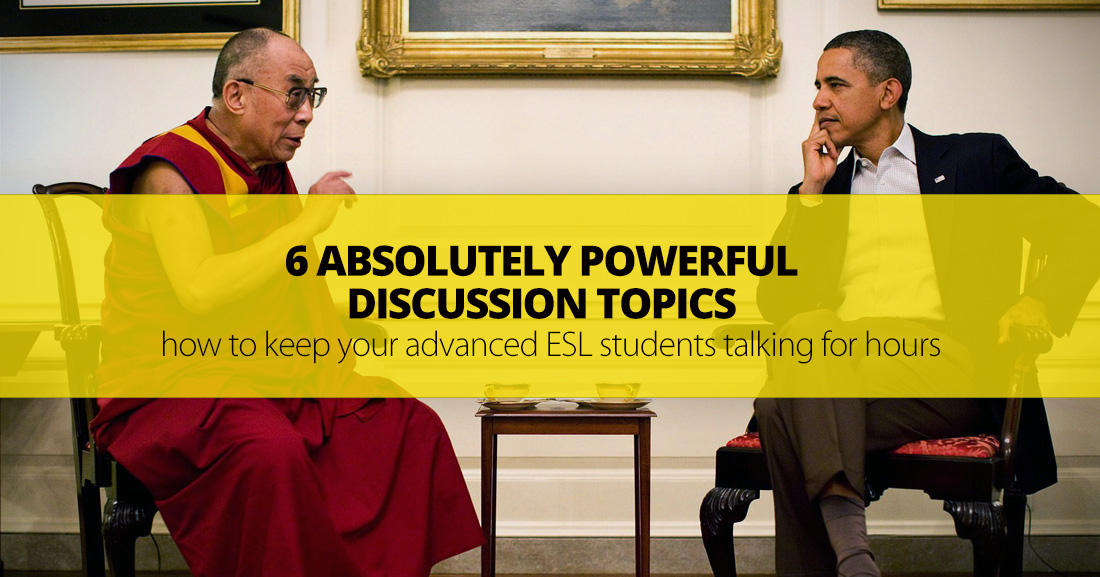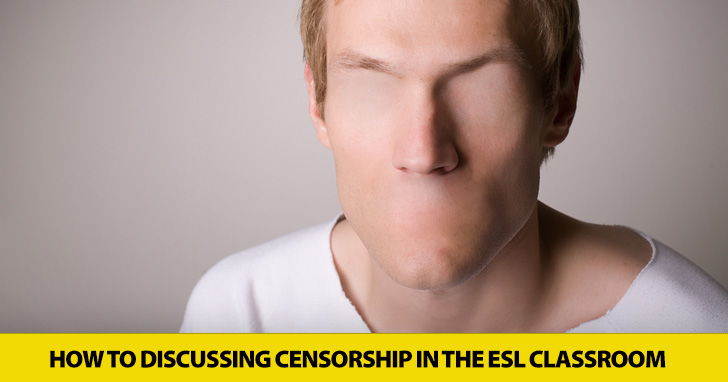6 Absolutely Powerful Discussion Topics: How To Keep Your Advanced ESL Students Talking For Hours


Studying them in an ESL context can be very rewarding and, if handled with sensitivity and balance, such discussions can enlighten and engage students from every background. Every government practices some form of censorship or imposes for some kind of restriction on free speech; it is interesting to consider why this happens, what its effects might be, and whether or not it achieves its aims. Certainly, the teacher must be careful not to appear to be criticizing those nations with state controlled media, or strong restrictions on journalistic activity; I believe it is possible to teach and discuss these topics without alienating anyone.

Begin with a brainstorm which will list the types of media or behavior which are sometimes censored. Teach vocabulary as it arises and be sure to check understanding in a number of different ways Your list could include:
TV programs, radio shows, movies, pop music, books, magazine articles, websites, certain public speakers, certain meaningful gestures
Elicit examples and methods of censorship. For example, certain movies are banned by being denied a rating by the British Board of Film Classification (BBFC) or the Motion Picture Association of America (MPAA). Gestures such as the ‘Mockingjay’ protest symbol are made illegal by government, with offenders liable to arrest. Racist, homophobic or otherwise incendiary public speakers are charged with incitement, or perhaps deported. Nudity on TV is pixilated; gratuitous scenes might be cut from movies.
In pairs, ask the students to list circumstances where censorship might be the best response. Depending on the demographics of the class, you’ll receive a broad variety of answers. Typical responses include:
Note: I have occasionally found that students from China espouse the suppression of news which might badly embarrass the government; they see a strong and united government, with broad and continuous public support, as a major pillar of China’s recent growth and economic success. I would not recommend arguing the point; I did so, both in China and the US, and simply hardened their attitudes while unwittingly constructing a barrier between the students and myself, as they now saw me as potentially ‘anti-China’. However you may feel about the issue, railing against it will change nothing.
I am always fascinated to see students exploring each other’s points of view and cultural background, especially in racially diverse classes. Organize the students into diverse pairs or groups, and then set up an interview with assigned or brainstormed questions such as:
Although there are plenty of genuine cases, it can be a fun challenge to create fictitious examples of contentious movies, books and websites, to see how your students react to the notion of censorship in each case. Consider those aspects which tend to results in a ban:
Here are two of my favorite hypotheticals, both very much based on existing media; the strength of using a fictitious example is that it avoids any national, racial or artistic prejudices the students might bring to the discussion:
Silent Assassins, a fast-paced action movie, has been criticized for containing gratuitous violence. Although it has a strong plot and the acting is pretty good, there are a number of extremely gruesome murders. One character is slowly strangled, another has his head cut off, and whole rooms full of bodyguards are killed with a sword. The movie was called ‘endlessly bloody’ by one critic; he complained that his wife was unable to watch the whole film, and chose to leave after an hour.
High on Life is an independent European film which follows a group of students as they try to finish their exams. In order to stay awake, they use a variety of drugs, which have both remarkably useful effects and a number of disturbing, negative results. Drug use is shown in a lot of detail, and critics insist that young people would easily be able to copy the behavior. Furthermore, the film doesn’t do enough to warn of the dangers of drugs, they insist, and there have been calls for these scenes to be cut from the film.
Most of our students are young people, for whom the Internet has always been available. I feel that it’s particularly important to encourage youngsters to think carefully about the wealth of information, possibilities and dangers presented by the Internet. Interview questions could include:
My students have gained a lot from carrying out short research tasks and then presenting their findings to the class. This practices a range of skills – reading, synthesis, critical judgment, writing and presenting – and tends to form part of my continuous assessment system. Possible topics include:
There are endless opportunities for engaging debates on censorship. These can be informal discussions or student-led seminars, could be based on a student presentation or on watching a movie (preferably not a banned one!), a documentary or a YouTube clip, or organized more formally. They are suitable both for in-class debates, and for research and writing topics. I have set them as term paper questions, and conversely spent twenty minutes informally chatting about them with advanced groups. Potential topics include:
For upper-intermediate and advanced classes, these topics have provided terrific food for thought, and also numerous integrated practice opportunities, resulting in both important critical thinking, and the use of high-level vocabulary and structures. I hope that your classes benefit from an open discussion of these topics, and come to understand their importance as we proceed into the 21st century.